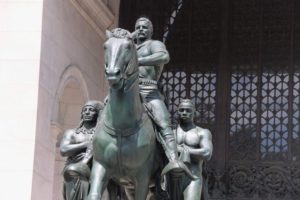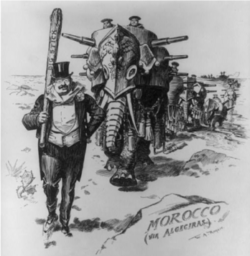Nationalist Foreign Relations – A History, Part 2
Our duty is to the United States…We should be friendly to all nations, and in any crisis we should judge each nation by its conduct in that crisis. We should condemn the misconduct of any nation, we should oppose its encroachments upon our rights with equal vigor…..according to what it actually does on the given occasion with which we have to deal.
Theodore Roosevelt, America for Americans, Afternoon Speech in St. Louis, MO; May 31, 1916
In November of 2018, French President Emmanuel Macron delivered what was billed as a stinging indictment of nationalism. In lofty poetic language, Macron expressed the European elitist view that the two world wars were caused by the pursuit of nationalism and implied that only transnational global institutions such as the European Union could keep the peace and preserve “universal values”. At the same time, the speech betrayed this theme by arrogantly claiming these values were uniquely French in origin. Indeed, it was a speech Napoleon himself, a past advocate of spreading “superior” French values, could easily have given to justify the wars of conquest France unleashed on Europe in the early nineteenth century.
Unfortunately, President Trump did not have the appreciation of history and international relations theory to effectively defend nationalism from Macron’s globalist stereotype. This defense could have started with a recitation of the wartime horrors of the Thirty Years War and the Napoleonic Wars, both waged in the name of values claimed to be universal at the time. It then would have pointed out that it was the realistic preservation of the basic national goal of sovereignty that kept the peace after Napoleon and then highlighted the real reason for the breakdown of this peace by 1914.
A good source for this defense can be found in former Secretary of State Henry Kissinger’s 1954 book “A World Restored”, which recounts how the eventual victors in the Napoleonic Wars crafted a system that avoided continental war in Europe for almost a century. Kissinger believed in the realist theory of international relations, which says all nation-states, whether democratic or autocratic, are naturally driven to maximize their power to preserve their sovereignty and survive in an essentially anarchic world. In contrast, the policy of liberal hegemony followed since the end of the Cold War is the Macron and Napoleonic dream of developing transnational institutions to reduce national sovereignty by spreading and, if necessary, imposing by force, the democratic capitalist model throughout the world.
For a brief periods of time, the French Empire of Napoleon and his coerced allies seemed to produce peace, but could not completely stamp out the national dreams of the different ethnicities and cultures of Europe. At the Congress of Vienna in 1815, the foreign ministers of Britain, Austria-Hungary and France set out to construct a realist international system that preserved this diversity. They did so by creating a balance of power among their nations in Europe that controlled the drive to maximize power and risk war. During that period, the main continental powers of France, Russia, Austria and later Germany would all enter into shifting alliances with and against each other while Britain remained in “splendid isolation” from these rivalries. If one alliance grew too powerful to the point of risking conflict, Britain would intervene to balance the relative power and prevent a conflict. It was an elegant diplomatic waltz that succeeded in avoiding all-out war during the rest of the nineteenth century.
The rise of Kaiser Wilhelm’s Germany and decline of Austria-Hungary upset this balance and forced Britain to expressly ally with France and Russia in response to the Triple Alliance of Germany, Austria and Italy. The balancer was now gone, and Europe experienced a series of crises provoked by Germany. Enter Theodore Roosevelt and the United States, which briefly acted as a balancer and brokered a peace in a 1905 crisis involving Morocco, as shown in the above cartoon from the time. Historians still wonder whether the First World War might have been avoided if TR had won the 1912 election and America had continued to serve the role of a balancing power. Instead, Woodrow Wilson won and appointed the isolationist William Jennings Bryan as Secretary of State, who strongly opposed any involvement in Europe. In the end, the US could not remain aloof, but entered the fray only after war had raged for three bloody years. Wilson’s League of Nations was supposed to prevent another war, but it’s globalist dreams proved to be useless against the expansionism of Nazi Germany and Imperial Japan.
Thus, the lessons of 1815 – 1945 are quite the opposite of Pres. Macron’s florid rhetoric. Peace is possible in a nationalist system so long as states avoid being trapped in rigid alliances that are not flexible enough to account for changes in relative national power. As TR said above, America and all nations must be free to identify and pursue their national interests and preserve their own culture according to the particular circumstances. Instead, alliances like the European Union (and NATO as well) freeze the international system into outdated alliances that do not adjust to the times and then try to justify their continued existence by exalting the alliance over its members. This creates tension between nations instead of alleviating it. The only sustainable route to peace is to accept the diversity of nations and insure there is a balancing nation that can intervene and prevent conflict.
Wilson’s mistake also proves that nationalism is also not the same as isolationism. Macron attempts to conflate the two to buttress his argument when, in fact, the balance of power system of the nineteenth century depended on Britain and then America becoming involved with other nations when necessary. In the modern age of ICBMS, climate change and pandemics, isolationism has never been an option and no one, including Trump, has seriously said otherwise. A nationalist system can address transnational problems so long as each nation’s sovereignty and interests are respected. The next post will show how this can be successfully done.


